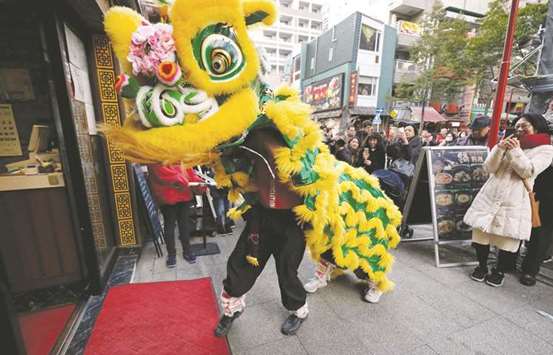People in China and across Southeast Asia welcomed the Lunar New Year yesterday with celebrations ranging from street festivals to intimate family dinners.
Residents of major Chinese cities including Beijing and Shanghai experienced quieter holidays than in past years, after authorities banned fireworks due to pollution and safety concerns. According to Chinese tradition, fireworks and firecrackers help scare off the past year’s monster, “guonian,” and usher in a lucky new year.
The decision to ban them didn’t sit right with some Chinese. “Lots of Beijingers, especially old people, are against it,” said Ma,a 37-year-old entrepreneur, who only wanted to give his last name. “My father-in-law is even considering trying to set off fireworks in secret to see if it’s really that strict.” Nevertheless, central Beijing was mostly quiet before midnight on Friday, unlike in previous years, when fireworks sounded day and night during the week-long holiday.
According to the Chinese zodiac, 2018 is the Year of the Earth Dog, following the Year of the Fire Rooster in 2017. The Earth Dog signifies conservatism, and fortune-tellers warn of bearish markets, natural disasters and international conflicts. The Lunar New Year is the most important holiday in China, and hundreds of millions of people have travelled to celebrate it with their families, making this the world’s largest annual human migration.
Authorities expect a total of almost 3bn trips by car, train and aeroplane in the 40 days surrounding the holiday.
On Chinese New Year’s Eve, families hold traditional dinners and watch a marathon televised gala. Children and youth receive red envelopes (“hongbao”) filled with money for good luck. Families decorate their doors with red paper cut-outs of the word for luck, “fu,” as well as images of fish, bats and the animal assigned to the new year — in this case, the dog.
The sides of doors are adorned with couplets of blessings. More Chinese are also travelling abroad during the holidays, with about 6.5mn people having booked trips to foreign countries.
Tourism revenue is expected to reach 476bn yuan ($76bn) in the days surrounding the Chinese New Year, an increase of 12.5% over last year, according to the National Tourism Administration.
In Taipei, Taiwanese President Tsai Ing-wen on Thursday encouraged people to remain positive, a week after a powerful earthquake killed at least 17 people and injured hundreds more. “We won’t fall in the wake of disasters because we unite,” Tsai said in a video of her Lunar New Year message. Tsai told residents in the coastal city of Hualien, which took the brunt of the quake, that Taiwan supports them.
In Hualien, about 400 residents who were staying in shelters had been relocated to nearby hotels for the Lunar New Year holidays, state-run Central News Agency reported.
Lunar New Year fireworks were cancelled in Hong Kong in light of a bus crash that killed 19 people on Saturday. Local celebrations like the iconic lion and dragon dance, however, were still scheduled in historic neighbourhoods as well as flower markets for purchasing orange trees, a popular new year’s gift.
In Thailand, red, the colour of good fortune during Chinese New Year, has returned after the country last year mourned the death of king Bhumibol Adulyadej and all celebrations and bright colours were banned.
The dragon dance in Bangkok’s China Town was set to mesmerise visitors, as usual. Chinese New Year is celebrated widely in Thailand, which has up to 10mn Chinese ethnic citizens out of its total population of 69mn.
A Singapore street festival featuring handcrafted lanterns, traditional Chinese opera performances and a food market peddling exotic delicacies was to take place atop a floating platform on the Singapore river.
Celebrations are set to culminate in a fireworks display against a backdrop of the glittering city skyline. Malaysian families were gathering for dinners of the colourful yeesang — a Cantonese salad with raw fish and shredded vegetables.

A Chinese lion dance troupe performs in front of a shop at Chinatown to celebrate the Lunar New Year in Yokohama, Japan.
